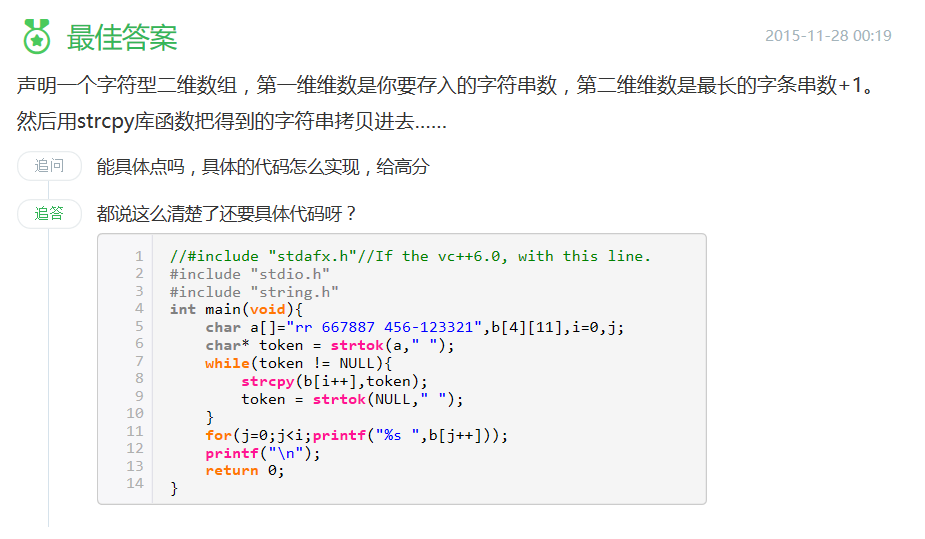有一个很帅的方法,可惜我对于string的原理还是不太懂 另外unique 和sort 可以处理string呢 嗯,解决了,但还可以优化哦
2017-11-20 20:30
483 查看
题目:点击打开链接
#include <cstdio>
#include <iostream>
#include <cstring>
#include <algorithm>
#include <stdlib.h>
using namespace std;
string a[10000];
int main()
{
int i;
char str[10000];
gets(str);
char *p = strtok (str," ");
while (p != NULL){
cout << p << endl;
i = 0;
//现在我已知的是一个首地址,而我要把一个地址赋给一个我连原理都看不懂的string你在逗我呢,
//等我弄清原理再来
i ++;
p = strtok(NULL," ");
cout << a[i-1] << endl;
}
int k;
for (k = 0;k < i;k ++)
cout << a[k] << endl;
sort (a,a+i);
int j = unique(a,a+i) - a;
cout << j;
}这里的问题主要就是无法把指针的值赋值给字符串,但是我现在好像有了一些新的感悟了。
哈哈我成功了#include <cstdio>
#include <iostream>
#include <cstring>
#include <algorithm>
#include <stdlib.h>
#include <set>
using namespace std;
struct Worddd{
char words[100];
};
struct Rule{
bool operator()(const Worddd &s1,const Worddd &s2){
return (strcmp(s1.words,s2.words)<0);
}
};
int main()
{
char str[1000000];
gets(str);
set<struct Worddd,Rule>st;
while (str[0]!='#'){
char*p = strtok(str," ");
int i = 0;
struct Worddd temp;
while (p != NULL){
strcpy(temp.words,p);
st.insert(temp);
p = strtok(NULL," ");
}
int j = st.size();
printf("%d\n",j);
st.clear();
gets(str);
}
}这里我比较骄傲的就是,set 的使用,和结构体的帮大忙,和那个能够把指针(迭代器)转换成字符的大神了。
那么问题来了,结构体到底帮了什么忙呢。
结构体在很多想用[]很纠结的地方可以不用纠结,像什么比较,都可以。
相关文章推荐
- 如何获取一个URL传参编码是UTF-8还是GBK的取巧解决方法
- 对于FastReport报表设计时出现一个闪闭的窗口的解决方法
- XP中java swing 在中文输入的时候总有一个输入窗口,非常难看,可以采用此种方法处理
- struts2.3.1.2 使用动态方法配置 Action,使得一个Action可以处理多个请求
- 对于当浏览器通过ajax加载的文件还是修改前的文件的处理方法
- 对于表单域乱码的处理!!只要一个简单的方法的,好好....
- ora-12154 TNS:"无法处理服务名"的一个解决方法(转)
- ora-12154 TNS:"无法处理服务名"的一个解决方法
- JAVA中申请了两个对象,分别在调用方法和声明方法中把其中一个对象直接赋值给另外一个对象,运行结果,求原理。
- wap获取手机号码,今天uc开启云加速,用公司的工具类获取是null,但是另外一个项目可以,应该这个项目的工具旧少了一些代码。。,网上找了 方法自己加可以
- JSON格式的特殊字符处理(只要一个方法解决)
- asp事务处理的另外一个方法
- 今天发现猎豹浏览器的一个大坑 Request.IsAuthenticated 一直为 false;另外附加原因以及临时的解决方法
- C++库研究笔记——使用函数模板还是类模板?+ 一个类型重复问题的两种解决方法
- 把一个用sql server 2005内置加密方法加密数据的DB从一台电脑备份后,还原到另外一台电脑上,出现的问题的处理办法
- java中目前为解决大数据处理的一个有效的开发方法——集群开发技术
- 超简单方法解决Struts2中一个action处理多个请求
- 基于Hadoop的云盘系统上传和下载效率优化及处理大量小文件的解决方法
- ora-12154 TNS:"无法处理服务名"的一个解决方法
- 成熟网站改版面临的问题和优化处理解决方法
